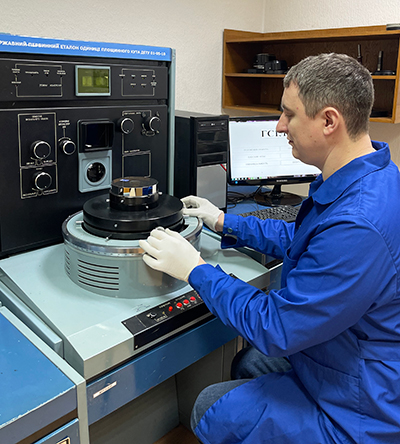Research and Production Laboratory of Angular and Geodetic Measurement
(laboratory № 23-2)
DETU 01-05-10 National Measurement Standard of the planar angle
DETU 01-05-10 had been created on the base of the Angle Measuring System GS-1L. The measurement procedure is realized by the GS-1L control system completely automatically. GS-1L consists of the rotating desk with build-in ring laser, autocollimator and measurement control unit.
The scientist-keeper of the National Measurement Standard of the planar angle is Yurii HLUSHKO, Deputy Head of Department №23.
CMC ID in the official KCDB website: EURAMET-L-UA-00000OR8-1.
Institute service identifier: UkrCSM/15.
The laboratory conducts the following types of works:
- development, production, and research of working measurement standards of the planar angle;
- development and supply of:
- Autocollimation plant for calibration of levels and theodolites (APCLT);
- VESSEL GRADUATION SYSTEM program package (VGS) for processing the measurement results of tanks using geodetic instruments;
- Photoelectric autocollimators AKF-0.2
- Conformity assessment of legal measuring instruments (MIs):
- Global navigation satellite systems for geodetic applications;
- Levelers;
- Storage tanks for commercial accounting of oil products and liquefied gas;
- Total stations;
- Theodolites.
- Calibration of:
- MIs and reproducing angular values (planar angle, grade, spatial angle);
- Storage tanks for commercial accounting of petroleum products and liquefied gas, ship tanks, barges for bulk materials by the geometric method using a 3D laser scanner.
- Verification of legal MIs:
- Global satellite navigation systems for geodetic applications;
- Levelers;
- Storage tanks for commercial accounting of oil products and liquefied gas by the geometric method using a 3D laser scanner;
- Total stations;
- Theodolites.
The working measurement standards base allows for:
- planning work in the construction industry and verification of construction removal;
- observation of building and construction deformations;
- determination of the capacities of technological and main fuel pipelines;
- carry out geodetic support for the installation and reconstruction of technological equipment (rolling machines, machines for production of paper and cardboard, etc.);
- determination of the volume of granular materials stored in bulk.

 Укр
Укр  Eng
Eng 